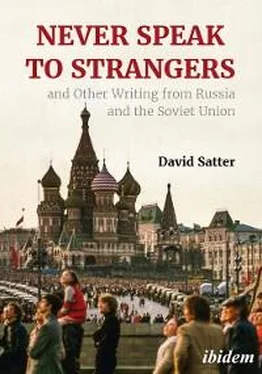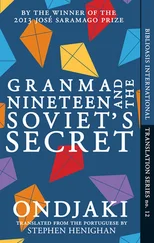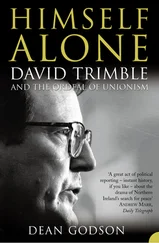I left the church, turned down a cobbled path between two stone walls and then hurried across a broad square. My pursuer appeared from around a corner. Finally, in desperation, I turned and began to advance on him. When he realized that I was coming toward him, he quickly turned his back. I changed directions and doubled back behind one of the government buildings and made my way to the wall of the Upper City. I began going down the steps, watching for my pursuer. To my surprise, I did not see him. I plunged into the crowded streets of the Old City and flagged down a cab. With 15 minutes to go before the scheduled meeting, I arrived at the Tallinna Kaubamaja, where scores of people were stepping through the slush. There were old, fat women with canes, young women with pallid faces and stringy blonde hair, nondescript men in worn overcoats and, off to one side, the old woman with the can of pencils whom I had encountered the previous night.
At exactly 2 pm, Ratas appeared on the street and led me to a nearby courtyard. He said that KGB agents were everywhere and the group had decided that it was too dangerous for us to meet in Tallinn. They wanted to meet not in Tallinn but in Moscow. I asked Ratas if he had reached Kalnins to tell him about the loss of my notes. He said “our friends” had been informed.
The train for Moscow left as darkness fell and I was relieved to see that my companion in the compartment was a woman engineer in her 50’s with a dark mustache. As we rode to Moscow, I tried to restore my notes from memory, adding to them and elaborating on them.
The next few days in Moscow were uneventful. Life assumed its previous rhythm. I began to think that the events in the Baltics were an aberration and maybe even, to some extent, the product of my imagination. One night, about a week after I had gotten back, I decided to call Kestutis in Vilnius although I had no doubt that Udam had already told him what happened on the Riga to Tallinn train. I called from the central telegraph office reaching him at the institute where he worked as an archivist.
After I described the loss of my suitcase, there was silence at the other end of the line. “What happened” Jokubynas asked, “were you drunk?” “Kestutis,” I said, “We have to be careful. They may be listening.” “Oh, yes,” Kestutis said and then his voice began to tremble. “They’re listening. Of course, they’re listening. They’re listening to every word.” With that I broke off the conversation and promised to call him again.
A week passed and there was no word from anyone in the Baltics until one night I received a frantic call from someone who said he had to meet me and was waiting in front of the Puppet Theater across the street from my apartment on the Ring Road. I didn’t recognize the caller’s voice and after the affair in the Baltics, I was wary of provocation. But I decided to go. When I pulled up in my car, I saw Antanas Terleckas and Ints Tsalitis.
We got into my car and began looking for a place to talk. It was too dangerous to talk in an apartment and we would have had to queue for hours to get into a café. Finally, after driving around for half an hour, we adjourned to the stairwell of a building on Leninsky Prospect.
Neither Terleckas nor Tsalitis appeared upset about the consequences for them of the loss of my suitcase. They were more concerned to make sure that I did not lose the opportunity to write about nationalism, particularly in Lithuania. During the next hour, they repeated to me the information that I had received in the Baltics, much of which I had already reconstructed from memory. When my notes were complete, we left the building and went for a ride in my car.
“The one thing you’ll never find,” Terleckas said as we drove, “or at least almost never find is a Russian who is willing to recognize a small people’s right to its own country. If you talk about Lithuania, they say that’s our Russian land, our country.”
I remarked to Antanas that I liked the Russian people. “They are good, sweet, kind people,” he replied, “but it doesn’t occur to them that the Lithuanians consider Lithuania to be their country and want to be able to live in it without them.”
“By the way,” Tsalitis said. “Why didn’t you meet our friends in Estonia?” Below us, Moscow was a carpet of apartment lights broken by the shadows of gothic government skyscrapers. “They called me and wanted to know why you never contacted them.”
“Who called you?”
“The Estonian nationalists, Udam, Ratas …”
“They said I never contacted them?”
“Yes.”
“Ints, I spent two days in Tallinn with Udam and Ratas. I’m expecting them to meet me here. Did either of you get a telephone call from Estonia telling you that my suitcase with the notes on Latvia and Lithuania had been stolen?”
“No,” Tsalitis said, “we heard about it from Kestutis.” I pulled the car over to the side of the road. A light snow began to fall and the snowflakes seemed to hang immobile in the arcs of light cast by the streetlamps.
I turned to look at Tsalitis and Terleckas who were sitting in the back seat. “If I didn’t spend those two days with Udam and Ratas,” I said, “then who did I spend them with?”
There was silence in the car.
“Do you mean?”
Antanas smiled. “They’re clever. You’ve got to hand them that.”
“Yes,” I said, “but these were Estonians.”
“The Estonian KGB,” Tsalitis said.
“You mean the whole thing, the meetings, the arguments, the discussion of KGB tactics, the small army they had following me, all that was a performance?”
“They are brilliant actors,” Antanas said.
“But what was the point of it? Just to prevent me from meeting a group of Estonian dissidents?”
“Not only that,” said Antanas. “The Soviet Union is a land of miracles and from time to time the KGB likes to create reality.”
The snow was coming down harder now and it was getting late. We rode silently through the Lenin Hills and along the embankment to Kutuzovsky Prospekt and then across the bridge and past the American Embassy to the Sadovoye Ring Road. I drove them to the bridge over the Tsvetnoy Boulevard where we got out of the car and shook hands. Terleckas gestured toward me as they got ready to leave. “Look at him,” he said to Tsalitis, “a free man. Can you imagine, a free man.”
Several weeks after my meeting with Terleckas and Tsalitis, the Financial Times published my report on nationalism in Lithuania under the headline, “The Ghost in the Machine.” A detailed summary of the article was broadcast back to the Soviet Union by the Russian service of the BBC so, in the end, the Lithuanian dissidents got their wish. What was happening in the republic became known in both the Soviet Union and the West.
I never made direct contact with the Estonian dissidents but, in May, the real Erik Udam arrived in Moscow and left a statement describing the KGB’s reaction to my visit to Tallinn. I was away and only received a copy of the statement several weeks later. According to the statement, Major Albert Molok of the Estonian KGB met with Udam in April at Molok’s request and suggested he organize a dissident group to give false information to Western correspondents. Molok said that it was his achievement that David Satter of the Financial Times had not met with him in February. He said Udam could choose the group’s members but they would have to be approved by the KGB. Udam said that such a scheme would quickly be discovered, Molok said that to keep the KGB connection secret, he would make sure that the group was lightly persecuted. When Udam rejected Molok’s suggestion, Molok asked him if he could recommend someone else but Udam said he would not recommend such a gigantic deception to anyone.
Читать дальше












